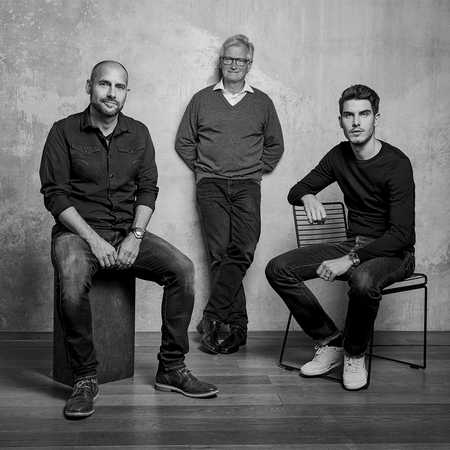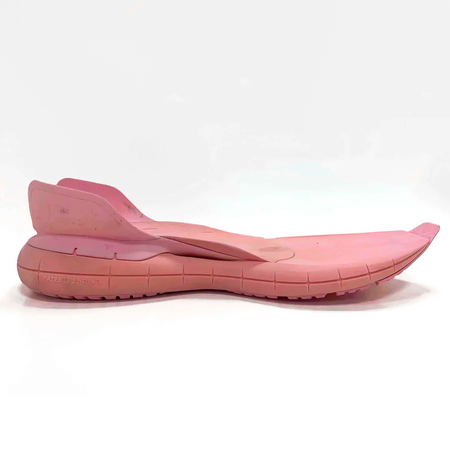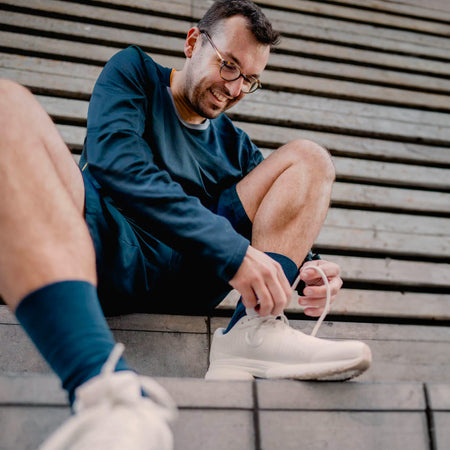SPECIALIST NURSE AND RUNNER:
"IT'S OFTEN THE SMALL GESTURES THAT COUNT"
Early in the morning, Oliver Schiffer's workday begins. At 6:00 AM, he starts his early shift at Lukas Hospital in Neuss. For the 31-year-old, this means being there for the patients in the surgical intensive care unit for the next eight hours, not only in terms of medical care but also on an interpersonal level. "As demanding as the profession can be, it also gives me a lot in return," says the specialist nurse for anesthesia and intensive care. To balance out his physically and mentally draining work routine, the father of a four-month-old daughter finds solace in his family and running.
Oliver Schiffer moves from room to room - it's time for the so-called bed check. The specialist nurse for anesthesia and intensive care at Lukas Hospital in Neuss examines his patients, their condition, how they are doing today. Is the endotracheal tube secure? Are the dressings in place correctly? Does the drainage bag need to be replaced?
The 31-year-old familiarizes himself with the patients' medical records, checks the technical devices, and looks at the lines and numbers on the monitor, from which he can read important health parameters. "At the start of the shift, it's important to get a detailed picture of the patients - that's the only way I can do justice to everyone," he says.
The door of the hospital room opens, and the attending physician joins for the ward round. Perfect timing - Oliver has just completed the bed check for his patients. The specialist nurse takes this time to plan the rest of the day: Who has a CT appointment today? Who needs their ventilation tubes replaced? "Organization and planning are extremely important so that we can provide the best possible care here," says Oliver as he prepares the medications for his patients.
In the corridors of Lukas Hospital, the nurses scurry through the hallways - it's bustling with activity. Several bed changes are scheduled for today. But before that, Oliver goes on his next round - for reassessment and washing. However, cleanliness alone is not the only focus. Oliver Schiffer wants to thoroughly examine the patients. "Only then can I properly assess the wounds and identify any possible changes," he explains.
Oliver has always been athletic. Today, it helps him in his daily work at the hospital. The nurse rarely experiences back or neck pain after work. However, tired legs are a common occurrence for Oliver after an eight-hour shift. "When I had a lot to do during work and was quite active, I can feel how heavy my legs are when I'm at home," says the avid runner. Once a year, he gets new running shoes; the old ones used to serve as his work shoes. "I'm on my feet for about 90 percent of the time in the hospital, so they have to be as comfortable as possible."
In the past, after a strenuous day, Oliver often arrived home, changed right away, and went for a run. "It was mainly about clearing my mind," he says. "Currently, I use a bike ride from work to home for that purpose."
The distance between the hospital and Oliver's home is twelve kilometers. He considers it a perfect distance to wake up before starting work and to process all the stories from the hospital after finishing. "On an intensive care unit, positive and negative experiences are very close together," says the nurse. "Unfortunately, the negatives often linger longer. That's why it's important to be able to shift your thoughts after work."
Recently, his four-month-old daughter has been helping him at home as well. "We spend most of our time with her," Oliver says. Instead of running sessions, they increasingly go for walks in the park. "And that's a good thing," says the young father.
Nevertheless, running remains Oliver's passion alongside his profession. Whenever he can find the time, the nurse laces up his running shoes, from 5-kilometer races to marathon distances. His goal is still to run one marathon per year. But shorter distances are also enjoyable, especially when his little daughter is with him – in the stroller.
For a long time, sports served as Oliver's greatest escape from the hectic daily life at the hospital. However, he now finds that he doesn't need it as intensely. His priorities have shifted. "The time with my wife and our little daughter is the ideal way to balance out the workday," says the 31-year-old. This is how he can unwind and recharge his batteries for the next shift at the hospital.













